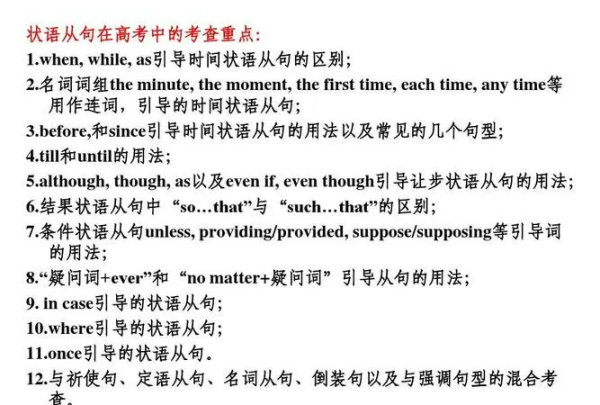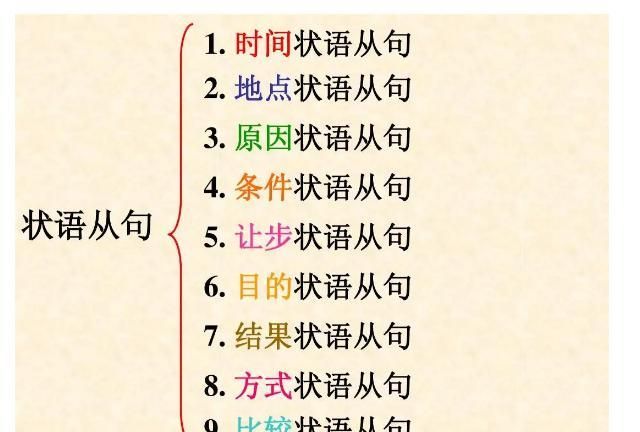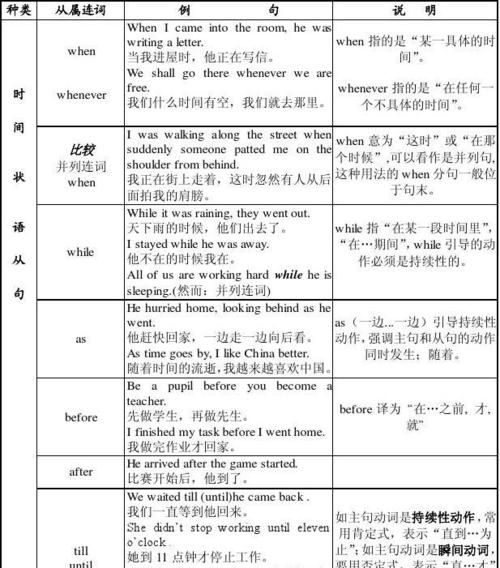本文目录
地点状语从句的例句有哪些
地点状语从句例句如下:
1、We must camp where we can get water.我们必须在能找到水的地方露营。

2、Go back where you came from.(where引导地点状语从句)你从何处来到何处去。
3、Go back to the village where you came.(where引导定语从句,修饰village)回到你来的那个村子里去。
4、you can go where you want to go .你可以去你想去的地方。
5、With a car,a person can go where he pleases and when he pleases.有了汽车,人可以想去哪儿就去哪儿,想什么时候去就什么时候去。
if引导的条件状语从句有哪些例子
if引导的条件状语从句例句如下:
1、主句将来时,从句一般现在时:表达可能发生的事情。
例句1:If it rains tomorrow, I will stay at home.
如果明天下雨,我就呆在家里。
例句2:If I miss the bus, I will take a taxi.
如果我没有赶上公交车,我就打个出租车。

2、主句一般现在时,从句一般现在时:用于表达常识性的、一定会发生的事情。
例句3:If you heat water to 100 degrees, it boils.
如果你把水加热到100度,它就沸腾了。
例句4:If you press the brake, the car stops.
如果你踩了刹车,车就会停下来。
3、从句为一般过去时,主句为would结构:表达不可能发生的事。
例句5:If I were you, I would marry Tom.
如果我是你,我就会和汤姆结婚。
例句6:If I had more money, I would buy a better car.
如果我有更多的钱,我就会买好一点的车了。
4、从句为过去完成时,主句为would + have结构:表达不是真正发生的事,也就是事情没有发生。
例句7. If I had studied harder, I would have passed my exam.
如果我再努力学习一点,我就能通过考试了。(注:实际上没有通过)
例句8:If I hadn’t woken up late, I wouldn’t have missed my train.
如果我没有睡过头,我就不会错过火车了。
从句和短语
1. 哪些从句是完整的句子
that 引导的名词性从句(主从,宾从,表从,同位语从句),从句意思完整,句子完整。that只起到引导的作用,它不充当从句的句子任何成分,也没有什么的意思。在引导宾从时that 一般可以省略。引导其他名词性从句时不省略。
whether/ if引导的名词性从句,whether/ if含有“是否”之意,如果去掉whether/ if,从句的意思是不完整的,但是句子结构还是完整的。并且它不可省略。
定语从句的引导词,是有实际意义的并且在从句中充当相应的成分(主语,宾语,表语,定于,状语),
状语从句必须要连词来引导,并不能省略,从句结构完整,但是如果少了连词的意思,整个从句意思就不完整。
2. 求助100句英语句子
现在完成时 I have lost my wallet. Jane has laid the table.Michael has been ill.He has returned from abroad.Mary has been ill for three days. I have lived here since 1998. He has already obtained a scholarship. I haven't seen much of him recently (lately). We have seen that film before. Have they found the missing child yet Have you ever been to Beijing I have never heard Bunny say anything against her. I have used this pen only three times. It is still good. George has met that gentleman on several occasions. Peter has written six papers so far. Man has now learned to release energy from the nucleus of the atom. There has bee too much rain in San Francisco this year. The friendly relations and cooperation between our two countries have been enhanced in the past few years. Thomas has studied Russian.We have had four texts this semester. I have seen the book。
I have been a singer。 I have broken the glass。
I have given you a book。 I have written a story。
现在进行时He is flying a kite now. I am writing with my new pen. Listen! The girl is singing 。 She is cleaning the classroom. I'm looking for my walletMy mom is doing the housework. I'm playing computer game. Tom is eating a cake. They are washing their clothes. The dog is chasing a cat. I'm doing my homework. You're washing your coat. He's watching TV. They're waiting for the train. What's going on there? She's watering the flower. I'm playing the piano. You're having breakfast. He's working on a project. They're running. He's swimming. She's fishing. He's talking to her. We're argueing some problems. They're drawing pictures. Are you helping your friends? The trees are being planted. He's listening to the radio. My father is repairing the car. My mother is closing the door.过去完成时We have been connected with each ohter before he came here.By the end of last year, Harry had been married with Mary for 30 years. The train had left when I got to the station. Mr Green had lived in New York for ten years before he came to China.We had learned 1000 words by the end of last term.Hardly had I reached the school when the bell rang. We had hardly begun our walk when it began to rain.He looked at me as if he had seen me before. He looked dog-tired, as if he had run 5000 kilometres. She walked by with out looking at me, as if i were a stranger The tree glows badly now as if nobody had watered it. They were talking happy as if they had known each other for a long time He speaks Eniglish very well as if he come from UK. They had saved money before they got married. It's Mary who gives piano lessons everyday.By nine o'clock last night, we had got 200 pictures from the spaceshipI had been at the bus stop for 20 minutes when a bus finally cameHe said he had worked in that factory since 1949.Mr. Smith died yesterday. He had been a good friend of mine.I didn't know a thing about the verbs, for I had not studied my lesson.I returned the book that I had borrowed.She found the key that she had lostHe said that he had known her well.I thought I had sent the letter a week before. When I woke up, it had already stopped raining.She didn't go to bed until she had finished he work.After he arrived in England, Marx worked hard to improve his English.They had wanted to help but could not get there in timeWe had hoped to be able to come and see you .Hardly had he began to speak when the audience interrupted him.No sooner had he arrived than he went away againIt was the third time that he had been out of work that year过去进行时I was playing computer last night. He was looking after his little sister yesterday morning. She was reading an English book this morning. They were listening the classical music on 2:00. My sister was crying this afternoon.I was playing badminton yesterday morning. I was checking my e-mails when you called. We were watching TV when you knocked at the door. I was chatting with a friend on line when my boss walked into my office just now. He was sleeping while everybody was playing this afternoon. What were you doing at that time? They were having a meeting at 4p.m. yesterday afternoon. My little sister was swimming this time the day before yesterday. When the UFO landed,I was taking a walk. When he left,it was raining outside. When my little brother was watching TV,I as writing. Were he sleeping at that time?When my mom left home I was writing a letter to LiMing. When Mr. Yu walked into the classromm, we were reading English. When I walked into the room, my little sister was sleeping. When LiLei met Kate on the road, she was running.We were leaving the office when the telephone 。
3. 一个句子最多可以有几个从句啊
理论上讲可以有无数个.主语可以是个从句,宾语可以是个从句,状语可以带个地点状语从句,带个时间状语从句,某个名词或代词再由一个定语从句或者两个定语从句修饰……举个例子:Whoever knows me can predict what I will react to such impolite words that sound so aggresive when I am not in mood.“任何一个了解我的人都料得到,在我不高兴的时候,对于听起来如此挑衅的话,我会如何反应.”这句话是我随便写的,就包含了一个主语从句,一个宾语从句,一个定语从句,一个时间状语从句.其实从句并不难,只要你能够仔细地分析,这个从句是什么从句,跟在哪个词后面,有什么作用.要学好英语,一定要学好从句,因为,在与外国人交谈或看英语文章的时候,这种从句他们常常信手(口)拈来,不懂得从句肯定是不行的.学好从句关键是要掌握从句最基本的结构以及此从句与彼从句的区别特征在哪里.。
4. 英语各种从句的句子结构
组成句子的各个部分叫句子成分。
英语句子成分有主语,谓语,表语,宾语,宾语补足语,定语,状语等。 顺序一般是主语,谓语,宾语,宾语补足语,而表语,定语,状语的位置要根据情况而定。
1、主语 主语表示句子主要说明的人或事物,一般由名词,代词,数词,不定式等充当。 Helikeswatch'ingTV.他喜欢看电视。
2、谓语 谓语说明主语的动作,状态或特征。 一般可分为两类: 1),简单谓语 由动词(或短语动词)构成。
可以有不同的时态,语态和语气。 Westud'yforthepeo'ple.我们为人民学习。
2),复合谓语:情态动词+不定式 Icanspeakalit'tleEng'lish.我可以说一点英语。 3、表语 表语是谓语的一部分,它位于系动词如be之后,说明主语身份,特征,属性或状态。
一般由名词,代词,形容词,副词,不定式,介词短语等充当。 Mysis'terisanurse.我姐姐是护士。
4、宾语 宾语表示动作行为的对象,跟在及物动词之后,能作宾语的有名词,代词,数词,动词不定式等。 WelikeEng'lish.我们喜欢英语。
有些及物动词可以带两个宾语,往往一个指人,一个指物,指人的叫间接宾语,指物的叫直接宾语。 Hegavemesom'eink.他给了我一点墨水。
有些及物动词的宾语后面还需要有一个补足语,意思才完整,宾语和它的补足语构成复合宾语。如: Wemakehimourmon'itor.我们选他当班长。
5、定语 在句中修饰名词或代词的成分叫定语。 用作定语的主要是形容词,代词,数词,名词,副词,动词不定式,介词短语等。
形容词,代词,数词,名词等作定语时,通常放在被修饰的词前面。 Heisanewstu'dent.他是个新生。
但副词,动词不定式,介词短语等作定语时,则放在被修饰的词之后。 Thebikeintheroomismine.房间里的自行车是我的。
6、状语 修饰动词,形容词,副词以及全句的句子成分,叫做状语。用作状语的通常是副词,介词短语,不定式和从句等。
状语一般放在被修饰的词之后或放在句尾。副词作状语时可放在被修饰的词前或句首。
HelivesinLon'don.他住在伦敦。 从句是指用于复合句中担当某个句子成分的主谓结构。
虽说从句自身的句子结构是完整的, 但是它不能视为独立的句子,因为它离开了主语就无法独立、完整地表达意思。按其所能表达的意义而言,它相当于一个词或是一个词组.例如: 1) Because they talk at home while the television is on , many people think they can talk at movies as well . (状语从句)许多人在家里是边看电视边谈话,所以他们认为在电影院也可以如此。
2) Whether he comes or not doesn't make any difference to me . (主语从句) 他来与不来对我都一样。 3)There is disagreement among economists about what money is and how money is measured(宾语从句)什么是货币以及怎样计量货币经济学家之间存有分歧。
4) China is not what it used to be . (表语从句)中国不是它过去的样子了。 5) Is there any proof that the food of plant differs from that of animals ? (同位语从句)有没有什么证据说明植物性食品不同于动物性食品? 6) Taxes consist of money that people pay to support their government . (定语从句) 税款是人们支持政府而交的钱。
如果将上面的复合句中所有的从句都独立出来,那将是这样的: 1) Because they talk at home while the television is on 2) Whether he comes or not 3) what money is and how money is measured 4) what it used to be 5) that the food of plant differs from that of animals 6) that people pay to support their government 我们很容易看出,上面的所有这些句子既不是陈述句、疑问句,也不是祁使句,更不是感叹句。也就是说,它们不是独立的句子;也只有在附属于主句后才能获得意义如下:1)因为许多人在家里是边看电视边谈话 2)他来与不来 3)什么是货币以及怎样计量货币 4)它过去的样子5)植物性食品不同于动物性食品6)人们支持政府而交的上面的这些句子在我们中文里如同是人们常说的"半截话";在英文中也就是个"词或词组"了。
B. 我们虽然说过,从句自身的句子结构基本是完整的,但是它不同于"独立句子"的是--每个从句的最前面都好象"戴了顶帽子"即:从属关系词。由此可以看出,从句的另一个特点是:从属关系词总是立于从句之首. C. 从句的再一个特点是:一般说来(除少数倒装的情况外),从句中的语序应该是正常语序。
D. 关于从句种类的划分有两种方法:按从句的词性划分和按从句的句子功能划分。如果按从句的词性划分,从句可分为三种:名词从句、形容词从句和副词从句。
如果按从句的句子功能划分(也就是按从句在句子中所担任的成分来划分),从句可分为:主语从句、宾语从句、表语从句、同位语从句、定语从句和状语从句。其实,这两种划分从句的方法在逻辑上是一致的.我们知道,能在句子里充当主语、宾语、表语和同位语的往往是名词、代词等,所以名词从句涵盖了主语从句、宾语从句、表语从句和同位语从句。
形容词和副词常分别在句中担当定语和状语,所以,形容词从句和副词从句其实分别是定语从句和状语从句。 名词从句名词从句在句中是一个相当于。
5. 求个句子求一个含5个从句的句子顺便解释下,谢谢不要有太多太难 爱
When I got there, I found that what I had expected to know disappeared completely as the policemen had scattered the crowd as they were ordered. 1,When I got there时间状语从句。
2,that引导一个宾语从句。 3,what I had expected to know 宾语从句中的主语从句。
4,第一个as引导一个原因状语从句。 5,第二个as引导一个方式状语从句。
后三个从句都是宾语从句中从句。
6. 什么是从句.什么是短语如题
我说说我自己的理解:一般情况下,一个句子由主,谓,宾,定,状,补语等成分构成.但对于其中的主语,宾语,定语,状语,如果在一个句子中构成他们的不是词组而是个完整的句子时,我们就把他们叫做从句,即从属于主句子的句子.从句通常有自己固有的一些引导词!举个例子:What we've got is something priceless.(我们手头的这件东西是无价的.) 其中,What we've got就是句子的主语从句(它是一个由What引导的主语从句),正是这个从句充当了整个句子的主语部分.同理,宾语从句和状语从句就是主句的宾语和状语位置上出现了句子.对于这3类从句,只要多分析句子成分和熟记引导词就没问题了. 要注意的是定语从句!定语在句子里的位置相当灵活,有一点要牢记:它在句子里只起到修饰作用,即便没有它,主句子仍然是完整的!因此一个很明显的规律就是,它通常会伴随一个词组出现.例如:The place which you mentioned yesterday happens to be a famous one.(巧的很的是,你昨天提到的那个地方很出名.)其中,which you mentioned yesterday 就是句子的定语从句,它用来修饰主语The place .我们试着把定语从句去掉,原句变为:The place happens to be a famous one.不难看出,它还是个完整的句子,少了的只是修饰主语的那部分. 从句要说的东西很多,如何区分它们也是难点,楼主要了解的话要多多听课和看书才行哦!短语就不用多说了吧,看单词表时经常会看到一些由几个单词构成的”东东”吧,譬如你在学习search这个单词时,单词表会跟着出现个in search of吧,它就是search这个单词的一个短语哦,短语在构造句子时相当重要,它们会让你的句子显得更为”漂亮”,要多用。
7. 有哪些名言要100句,还要列出来
1. 成熟的人,不问过去,聪明的人,不问现在,豁达的人,不问未来。
2. 一个人的快乐,不是因为他拥有的多,而是因为他计较的少。 3. 生气,就是拿别人的过错来惩罚自己。
原谅别人,就是善待自己。 4. 未必钱多乐便多,财多累己招烦恼。
清贫乐道真自在,无牵无挂乐逍遥。 5. 静坐常思己过,闲谈莫论人非,能受苦乃为志士,肯吃亏不是痴人, 敬君子方显有德,怕小人不算无能,退一步天高地阔,让三分心平气和, 欲进步需思退步,若着手先虑放手,如得意不宜重往,凡做事应有余步。
持黄金为珍贵,知安乐方值千金,事临头三思为妙,怒上心忍让最高。 切勿贪意外之财,知足者人心常乐。
若能以此去处事,一生安乐任逍遥。 6. 处事不必求功,无过便是功。
为人不必感德,无怨便是德。 7. 平安是幸,知足是福,清心是禄,寡欲是寿。
8. 人之心胸,多欲则窄,寡欲则宽。 9. 宁可清贫自乐,不可浊富多忧。
10.受思深处宜先退,得意浓时便可休。 11.势不可使尽,福不可享尽,便宜不可占尽,聪明不可用尽。
12.滴水穿石,不是力量大,而是功夫深。 13.平生不做皱眉事,世上应无切齿人。
14.善人而交, 择善书而读, 择善言而听, 择善行而从。 15.多门之室生风,多言之人生祸。
16.世事忙忙如水流,休将名利挂心头。粗茶淡饭随缘过,富贵荣华莫强求。
17.“我欲”是贫穷的标志。事能常足,心常惬,人到无求品自高。
18.人生至恶是善谈人过;人生至愚恶闻己过。 19.诸恶莫做,众善奉行,莫以善小而不为,莫以恶小而为之。
20.莫妒他长,妒长,则己终是短。莫护己短,护短,则己终不长。
21.做事不必与俗同,亦不宜与俗异。做事不必令人喜,亦不可令人憎。
22.世上有两件事不能等:一、孝顺。二、行善。
23.存平等心,行方便事,则天下无事。怀慈悲心,做慈悲事,则心中太平。
24.心量狭小,则多烦恼,心量广大,智慧丰饶。 25.平生无一事可瞒人,此是大快。
26.“恶”,恐人知,便是大恶。“善”,欲人知,不是真善。
27.扶危周急固为美事。能不自夸,则其德厚矣! 28.遇顺境,处之淡然,遇逆境,处之泰然。
29.是非天天有,不听自然无。 30.五官刺激,不是真正的享受。
内在安祥,才是下手之处。 31.人为善,福虽未至,祸已远离;人为恶,祸虽未至,福已远离。
32.不妄求,则心安,不妄做,则身安。 33.不自重者,取辱。
不自长者,取祸。不自满者,受益。
不自足者,博闻。 34.积金遗于子孙,子孙未必能守;积书于子孙,子孙未必能读。
不如积阴德于冥冥之中,此乃万世传家之宝训也。 35.积德为产业,强胜于美宅良田。
36.能付出爱心就是福,能消除烦恼就是慧。 37.身安不如心安,屋宽不如心宽。
38.罗马人凯撒大帝,威震欧亚非三大陆, 临终告诉侍者说:“请把我的双手放在棺材外面, 让世人看看,伟大如我凯撒者,死后也是两手空空。 39.梦中冥冥有乐趣,觉后空空无大千。
40.儿孙自有儿孙福,莫为儿孙做远忧。 41.情生智隔。
42.征服世界,并不伟大,一个人能征服自己,才是世界上最伟大的人。 43.把自己的欲望降到最低点,把自己的理性升华到最高点,就是圣人。
44.嫉妒别人,仇视异己,就等于把生命交给别人。 45.一个人如果不被恶习所染,幸福近矣。
46.诽谤别人,就象含血喷人,先污染了自己的嘴巴。 47.恨别人,痛苦的却是自己。
48.人之所以平凡,在于无法超越自己。 49.大肚能容,断却许多烦恼障,笑容可掬,结成无量欢喜缘。
50.改变自己,是自救,影响别人,是救人。 51.谎言像一朵盛开的鲜花,外表美丽,生命短暂。
52.唯其尊重自己的人,才更勇于缩小自己。 53.人不求福,斯无祸。
人不求利,斯无害。 54.智者顺时而谋,愚者逆时而动。
55.常常责备自己的人,往往能得到他人的谅解。 56.见己不是,万善之门。
见人不是,诸恶之根。 57.学一分退让,讨一分便宜。
增一分享受,减一分福泽。 58.念头端正,福星临,念头不正,灾星照。
59.善人行善,从乐入乐,从明入明。恶人行恶,从苦入苦,从冥入冥。
60.心慈者,寿必长。心刻者,寿必促。
61.骨宜刚,气宜柔,志宜大,胆宜小,心宜虚,言宜实,慧宜增,福宜惜,虑不远,忧亦近。 62.苦口的是良药,逆耳必是忠言。
改过必生智慧。护短心内非贤。
63.你目前拥有的,都将随着你的死亡而成为他人的。那为何不现在就布施给真正需要的人呢? 64.人之所以痛苦,在于追求错误的东西。

带状语从句英语格言佳句及翻译
1.帮我写50个含状语从句的句子
时间状语从句1When you think you know nothing, then you begin to know something.当你以为自己一无所知的时候,你就是在开始知道一些事物了。
2When truth is buried under the ground ,it grows, it chokes, it gathers such an explosive force that on the day it bursts out , it blows up everything with it.当真理被埋在地下的时候,它在生长,它感到压抑,它蓄存着这么一种爆炸性力量,一旦冒出,它就会炸破一切!3Strike while the iron is hot. 趁热打铁。4You can feel the air moving as your hand pushes through it.当你的手在空气中挥动的时候,你就能感觉到空气在流动。
5Our headmaster laughed as she spoke.(我们的校长边谈边笑。) 6When she came in, I stopped eating.她进来时,我停止吃饭。
7When I lived in the countryside, I used to carry some water for him.当我住在农村时,我常常为他担水。8We were about to leave when he came in.我们就要离开,就在那时他进来了。
9.We always sing as we walk.我们总是边走边唱。10.As we were going out, it began to snow.当我们出门时,开始下雪了。
11It will be four days before they come back. 他们要过四天才能回来。12Einstein almost knocked me down before he saw me.爱因斯坦几乎把我撞倒才看到我。
13My father had left for Canada just before the letter arrived.我父亲恰好在信到之前去加拿大了。14They had not been married four months before they were divorced. 他们结婚还不到四个月就离婚了。
15After you think it over, please let me know what you decide.你仔细考虑过以后,告诉我你是怎样决定的。16After we had finished the work, we went home.完成工作之后,我们回家了。
17I didn't go to bed until(till) my father came back.直到我父亲回来我才上床睡觉。18I worked until he came back.我工作到他回来为止。
19I didn't work until he came back.他回来我这才开始工作。20Please wait until I arrived.在我到达之前请等我。
21I will go there directly I have finished my breakfast. 吃完早饭,我立即到那里去。22The moment I heard the news, I hastened to the spot.我一听到消息,马上赶到了出事地点。
23As soon as I reach Canada, I will ring you up. 我一到加拿大,就给你来电话。24.By the time you came back, I had finished this book.到你回来时,我已经写完这本书了。
25Each time he came to Harbin, he would call on me. 他每次来哈尔滨,总是来看我。地点状语从句1.We must camp where we can get water.我们必须在能找到水的地方露营。
2you can go where you want to go . 你可以去你想去的地方。3With a car a preson can go where he pleases and when he pleases.有了汽车,人可以想去哪儿就去哪儿,想什么时候去就什么时候去。
4And where there is shale there is likely to be oli.哪儿有页岩,哪儿就可能有石油。5Where there''s a will, there''s an Inheritance(遗产) Tax.哪里有遗嘱,哪里就有遗产税。
6.We'll go where working conditions are difficult. 我们要去工作条件艰苦的地方。Sit wherever you like. 你爱坐哪儿都可以。
7Keep it where you can see it. 把它放在你看得见的地方。8He lives where the climate is mild. 他住在一个气候温暖的地方。
9I'll take you anywhere you like. 你想到哪儿我就带你到哪儿。10You can't camp where / wherever / anywhere you like these days. 如今你可不能随意在哪儿宿营。
补充:11Wherever I am l will be thinking of you. 我不论在哪儿,都会想你的。12Everywhere I go, I find the same thing. 不管我走到哪里,我都发现同样情况。
13Wherever he goes, there's always a spy hanging about. 不管他到哪里,总有一个密探跟着。14Wherever he is he'll be thinking of you. 不管他在哪里,他总会想着你。
15We'll go wherever you say. 你说到哪里我们就到哪里。16Everywhere Jenny goes she's mistaken for Princess Diana. 无论詹妮走到什么地方,她都会被误认为是戴安娜公主。
17The church was built where there had once been a Roman temple. 教堂建在曾一度是罗马神庙的地方。18Next time I hope you'll go where I tell you to. 下次我希望你去我告诉你去的地方。
19No matter where you now are in writing, you can improve with practice. 不管你在写作上你处于什么水平,练习都能帮你提高。20Keep your mobile phone with you no matter where you are. 不管在哪里你都要带着手机。
21With a special train ticket you can travel wherever / anywhere / everywhere you like in Europe for just over£100. 你如持有专车票,仅花一百多一点英镑,就可以到欧洲各地旅行。22Where possible, they tried to acquire colonies. 只要可能,他们就设法取得殖民地。
23Avoid structures of this kind wherever possible. 只要可能,就要避免这种结构。24Where most people saw nothing but a hardened criminal, I saw a lonely and desperate man. 许多人只看见一个冷酷无情的罪犯,但我看到的却是一个孤独而绝望的男人。
25Where there is great love, there are always miracles。.。
2.造几个状语从句的英语句子,中文带翻译
为您解答
She was taking a walk when I called her.
我叫她时,她正在散步。
If I had enough money,I would buy the car.如果我有足够的钱,我就买汽车了。
Because he was ill,he was absent yesterday.
因为他病了,他昨天没有来。
Tom went to school earlier than Kate did.汤姆上学比凯特早。
Please do as I do.请照我做的那样去做。
He studied hard so that he might succeed.他努力学习,以便成功。
3.翻译六句英语句子
1.No matter how hard I worked, it seemed that I couldn't sovlve this maths problem.2.Although we have not seen each other many years, but he has not changed as if. 3.Successeful lecture calls for such as postures, hand signal, and timing control etc.non- language exchange. 4.Before attending the party, please make sure the gift must suit for the master's family. 5.We did not know how can distract the pain his son's dying which brings to her。
4.包含状语从句和定语从句的英语句子
状语从句和定语从句的句子
1. When I am on the way to school every day, I always meet the girl who has long hair.
2. You can ask for help form the teacher who teaches math, if you can't work out the problem.
3. When he stayed up watching, he was late for school the next morning, which made his teacher very angry.
4. The girl who is a little shy was praised by her teacher because she helped an old man get home yesterday.
5. Those who work harder than others will get a better future when they grow up.
6. After I graduate from middle school, I will go to the college where my father studied 25 years ago.
7. We will never forget the days when we spent together in the countryside no matter where we go.
8. However difficult the problem is, he can work it out without any help that his teacher gives.
9. As you can see, we have tried our best to improve our environment that has polluted by us.
10. Before you come here, you had better make a phone to the worker who has worker here for 10 years.
5.英语 方式状语从句 仿造例句 写句子,, 急,
1. He talks as if he knew everything.He talked as if he had known everything.2. He treats me as if I was a child.He treated me as if I had been a child.3. He looks at me as if we never met before.He looked at me as if we had never met before.4. He turns round as if he did not see me.He turned round as if he had not seen me.1. It looks as if he is older than you.2. It sounds as if someone is knocking at the door.3. We fell as if there was omething worng with the plan.4. It tastes as if the soup is a little salty.5. It smells as if mother cooks dinner.1. He standed up as if to leave.2. He waved his hand as if to say goodbye to us.1. He looked out of the window as waiting for someone.2. He sitted there as if thinking.每组都只给了一个答案。
如果你是自己不想做作业,那就这样了。如果你只是想知道自己做得对不对,那给我消息,我把剩下的发给你。

以上就是关于状语从句例句00句短时 ,地点状语从句的例句有哪些的全部内容,以及状语从句例句100句短时 的相关内容,希望能够帮到您。
